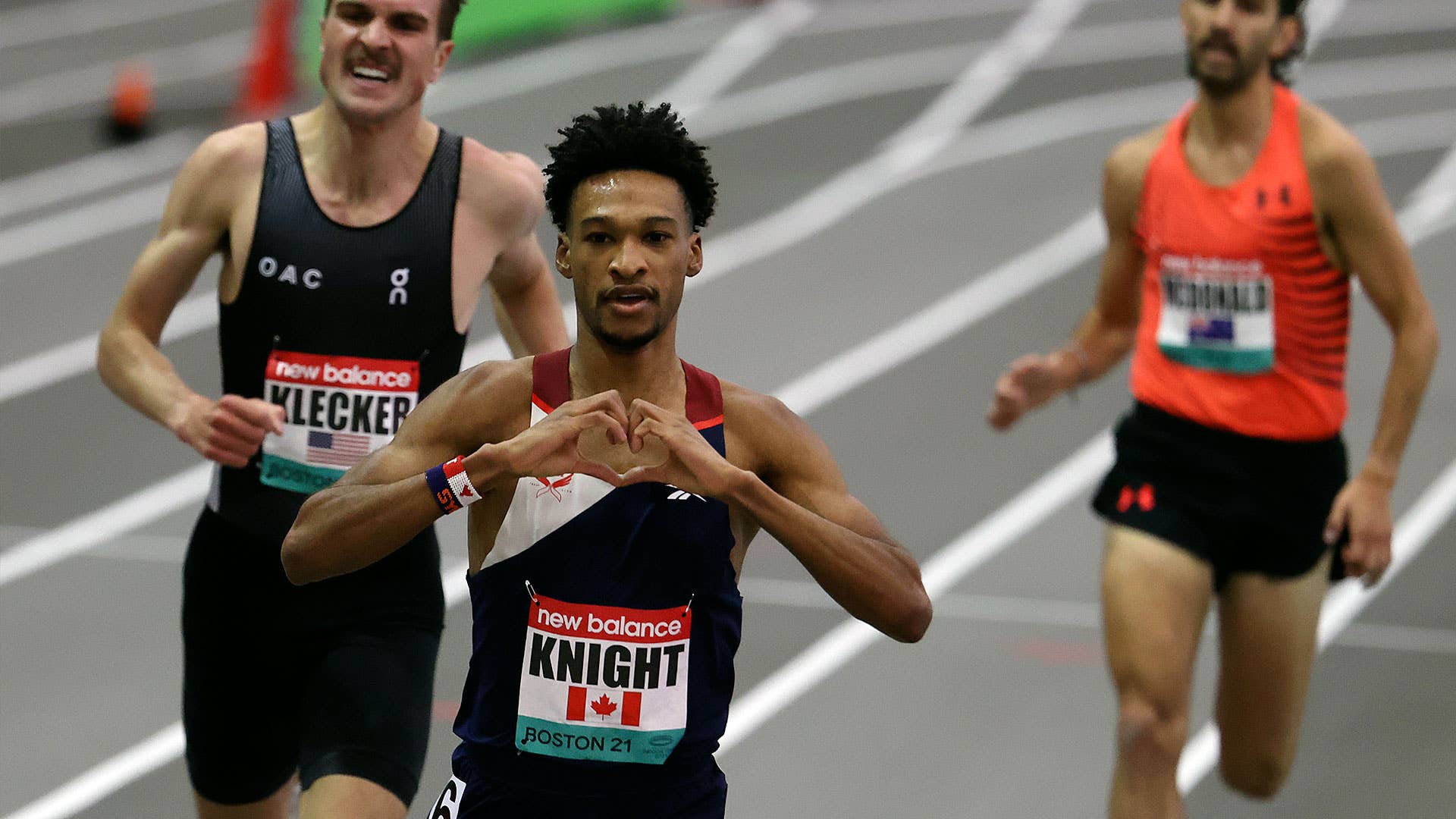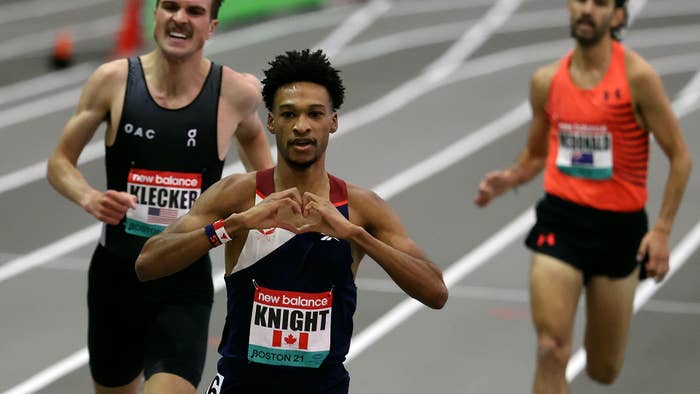
They often called Justyn Knight the Carmelo Anthony of Syracuse University’s cross-country team. The Toronto native graduated from the NBA star’s alma matter in 2018 as an NCAA champion, an eight-time All-American, and a three-time Syracuse Male Athlete of the Year. Now, the 25-year-old is going to his first Olympic Games with a chance to medal for Team Canada in the men’s 5,000-metre event.
But in his first year as a professional in 2019, Knight was having trouble adjusting to the new lifestyle away from friends and family. He began skipping his second workout when it was cold or rainy outside, ate fast food four or five times a week (Chick-Fil-A is his favourite), and showed up to the New Balance Grand Prix in Boston twenty pounds overweight. Knight ran the men’s mile in 4:03.34, the worst he’s ever been timed at the distance in a competitive race, and dead last of the seven-man field.
“It was a huge turning point in my career,” Knight tells me over Zoom from Charlottesville, Virginia, where he currently trains with his sponsor club, Reebok. “I just had that moment where I was just like: This is not who I am. This is not who Justyn Knight is. I don’t get dead last in a race.”
“And, what am I going to do to make sure that this never happens again?”
Not a person to keep mementos from previous competitions, the one thing hanging on Knight’s refrigerator is the bib from that race, with his time and place written on it in black sharpie. It serves as a reminder of how awful and embarrassed he felt after that race, “mentally, emotionally, and physically,” which he looks at every day in order to never be in that position again. Plus, it’s a tool he uses to push himself to train harder, sleep better, eat healthier, and ultimately run faster in an individual sport that demands self-motivation at all times.
“I think to sum it up, I’m actually behaving like a professional now, someone that admires his own craft and knows that it’s not easy to do,” Knight says of what has changed in order to reach new heights this year, including his first Olympic Games.
“Running is not something that you’re just gifted of doing; you actually have to put work in.”
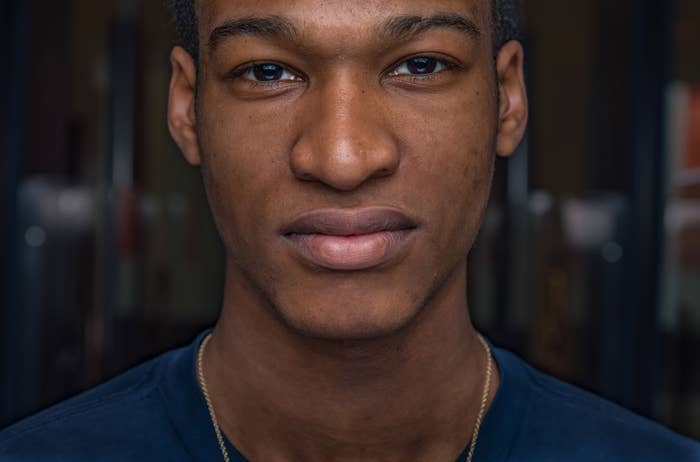
Track and field wasn’t even on the Knight family radar for most of Justyn’s childhood. In fact, Knight calls it a “fluke” that he ever got into the sport.
Growing up as one of the premier point guards in the Greater Toronto Area, Knight played basketball for his alma mater, St. Michael’s College School, and his AAU team, the Northern Kings. He slept in the uniform of his childhood idol, Michael Jordan, alongside a real basketball that he used as a teddy bear, dreaming of one day playing in the NBA.
But in grade 10, between goofing off with his friends and missing class due to being on the school’s basketball and volleyball teams, Knight received a mark of 68 in gym class. His teacher, Mr. Chittles, was willing to give Knight a chance to improve his mark if he successfully completed a near-five-kilometre run through Cedarvale Park, just across the street from the school.
“Running is not something that you’re just gifted of doing; you actually have to put work in.”
Knight showed up for the run in basketball shoes and shorts and went on to become the first person to finish, breaking the school record for 10th graders. The specific time wasn’t kept, but teachers say it was a little over 15 minutes and 20 seconds, significantly faster than his classmates who were on the school’s cross-country team, which Knight consequently joined, giving up basketball for a sport that would give the 5-foot-8 Knight more opportunities in life.
“If he didn’t do that,” Knight said of his teacher making him run for an improved mark. “I wouldn’t be where I am today, to be honest.”
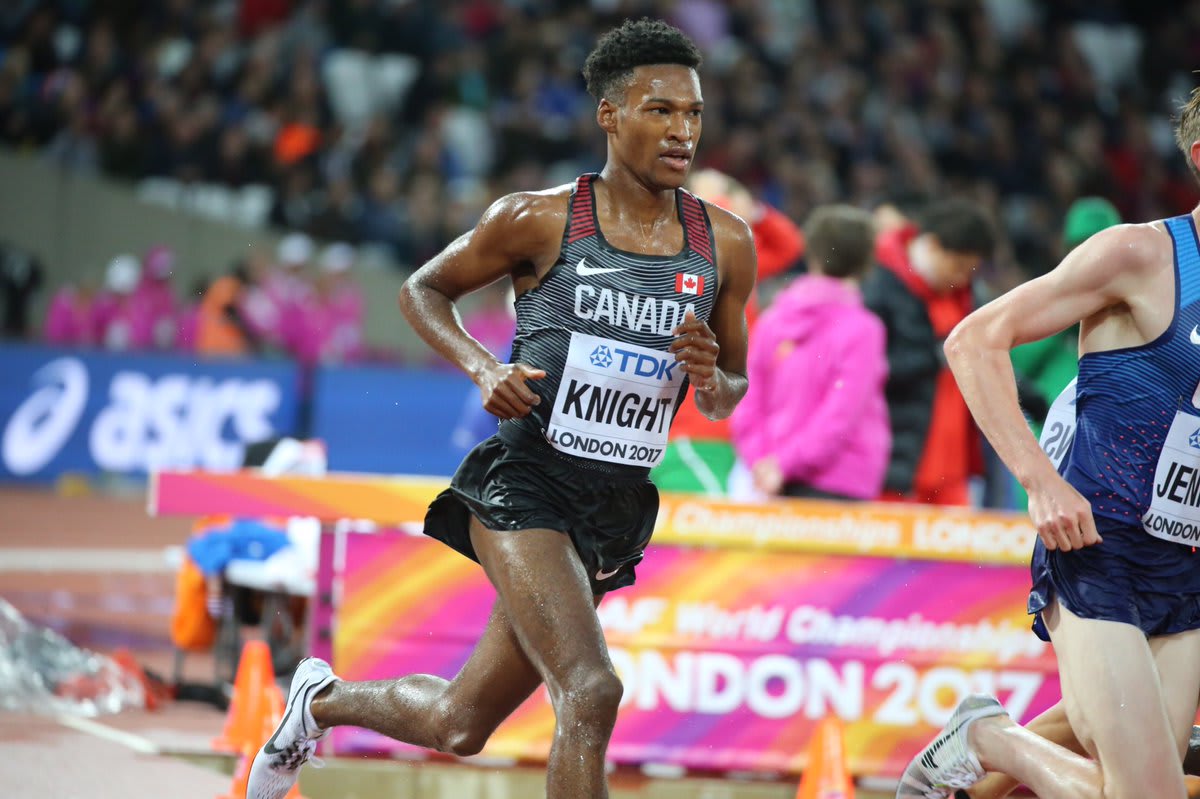
Where Knight is today is Tokyo, Japan preparing to race in the men’s 5,000-metre event in his first ever Olympic Games. And while he is a naturally gifted runner—one who qualified for the men’s 1500-metre race as well, which he decided not to compete in at the Olympics despite owning the Canadian record for the event—he got here by working hard to improve every single year since he started running following that monumental gym class.
After winning a provincial cross-country title as a high school senior, Knight enrolled at Syracuse in 2014. During his freshman year, he won the 1,500-metre ACC Championship and was named Syracuse Rookie of the Year. By the time he graduated in 2018, he left as an NCAA champion in cross-country and at the 5,000-metre indoors, a nine-time ACC conference champion, an eight-time All-American, and a three-time Syracuse Male Athlete of the Year, leading Syracuse cross country to its first national championship in 64 years. He also made it to the final of the world championships in 2017 and 2019 for the 5000-metre.
“From about the end of his freshman year on, he was very world-class,” said coach Chris Fox, who, after recruiting Knight to Syracuse and revitalizing the distance program, followed Knight to Reebok. “It was nice because Justyn makes good progress every year. We haven’t had a year where we went backwards, we’ve always been able to make good progress.”
However, the coronavirus pandemic did put that progress into question, albeit briefly. After missing out on the Olympic standard in the 5,000 event in Rio 2016 by just one second due to barely sleeping the night before the qualifying event in order to download the new Drake album—another teachable moment for the young Justyn—Knight had his eyes set on Tokyo 2020. In fact, he had already run under the Olympic standard in the men’s 5,000 when the pandemic delayed the Games, making him feel robbed.
“If someone asked me about losing, I can recall every single moment where I messed up or I should have done this or I should have done that, and I can give it to you in great detail, too.”
Knight was forced to train without teammates from March 2020 to October 2020 because he was so afraid of the virus and due to the protocols in place. He was away from family and friends and would only regularly see coach Fox. But the time away from competition might have been a blessing in disguise.
“It’s been interesting for us… but just having a free year to make progress ended up being really good for Justyn,” Fox said. “He had been competing non-stop for six years. So to back off the competing and the training for a while, and we did a little bit more base work and more strength work, has really helped Justyn improve.”
Knight got a chance to showcase that improvement during a Diamond League 5,000-metre race in Italy last month, clocking a personal best of 12:51.93 in his first competitive race at that distance since 2019, shaving almost 20 seconds off his previous personal best. On top of keeping up with some of the best long-distance runners in the world, placing fifth, and meeting his goal of running under thirteen minutes—something he expects will be necessary to medal in the Olympics—it made him the second-fastest North American in the event of all-time.
Hard work and determination are part of what make Knight a medal contender at these Olympic Games. So too are getting a good sleep and eating right, as Knight learned the hard way. But what sets Knight apart has always been his brain, a tool he continues to sharpen.
While it’s easy to appreciate the excitement that comes with Olympic sprinting or hurdles—linear sports that often end within seconds, capturing our short attention spans on the TV—middle and long-distance running are actually much more strategic sports. In fact, the longer the race, the more room there is for error and the more avenues there are to get from the back to the front, or vice versa. The strategy involved is what Knight enjoys most about the sport, and watching him, you begin to appreciate some of the intricacies of long-distance running.
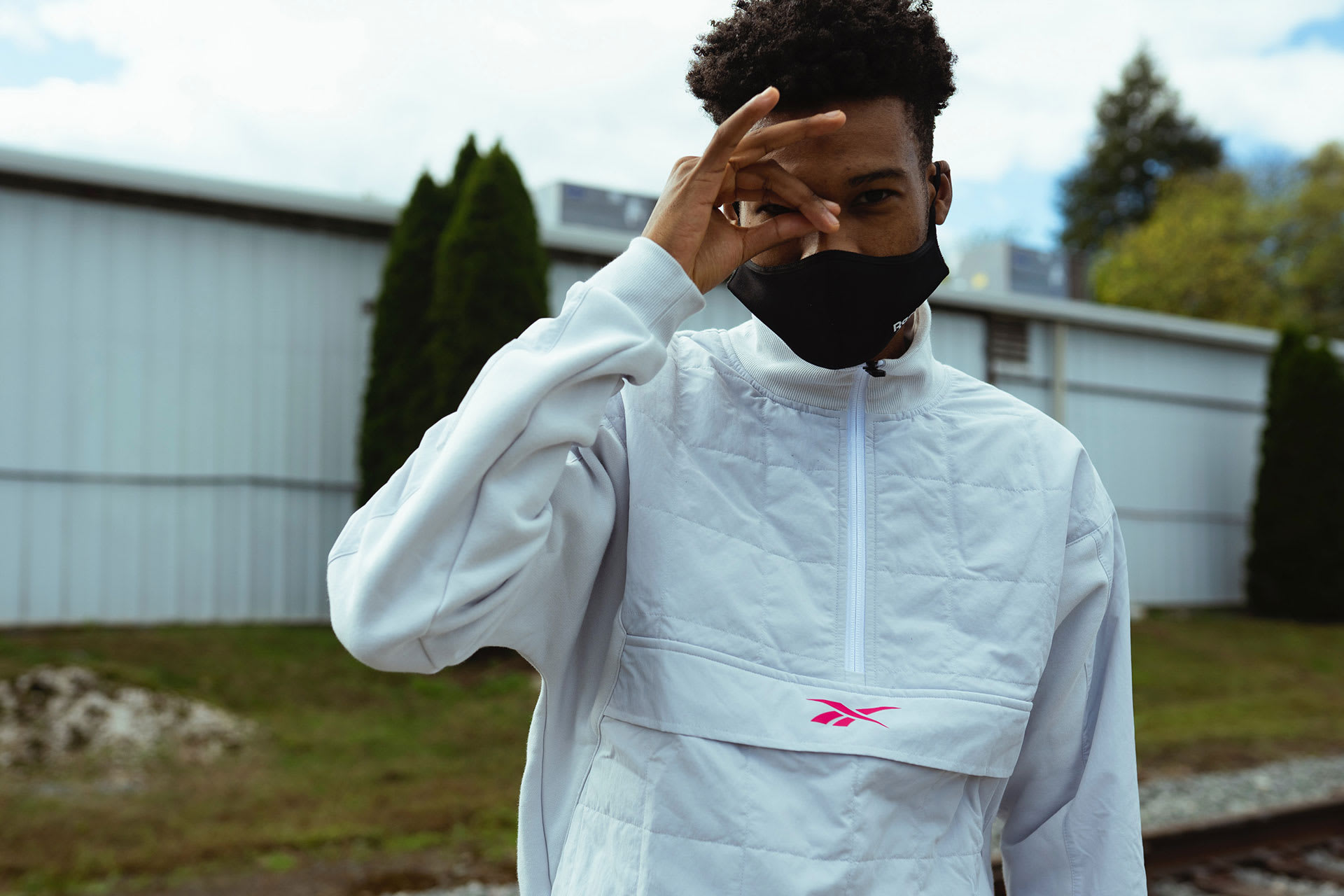
Knight was known for his finishing kick in college, the final gear he would turn to the final 100 or 200 metres to push past his competition, speed that he attributes to his mother’s Jamaican roots. But in order to be in a good position to finish a race that takes thirteen minutes, Knight learned the tricks of the trade: when to drift behind people and when to lead the pack, how to analyze his competitors’ running form, when to make a pass and how to execute it, and how to adapt to a race rather than just following a set plan.
“One of the strategies that I use is: I never look back to see where my competitors are, I always kind of look down,” Knight explains. “And the reason for that is when you look back, it kind of tells your competitors that, ‘Oh he’s nervous, he’s trying to figure out where we are because he’s not feeling as good.’ So instead of looking back, I look at the ground and see where my shadow is in comparison to the shadows either behind me beside me. And from there I can kind of judge how close my competitors are to me.”
Plus, long-distance running can be a more savage sport than people give it credit for. Because while there might not be any trash talking during a race, there are other ways to leave your opponents feeling helpless.
“I’m pretty aware of people’s running form and how they look when they run when they’re comfortable, and then I do notice what they look like when they’re starting to deteriorate and get tired,” Knight adds. “So, if I see someone’s form starting to break, and it looks like they’re getting tired, then I’m going to attack and go in front of them, to kind of leave them hopeless and feeling like they can’t keep up with the pace.”
But watching Knight run, you would never know how many calculations he has going on in his mind. He looks calm, present, and focused on himself. And maybe that’s because he is focusing on himself. For most of the race, at least.
“A lot of people, they’ll look at the laps, they’ll look at the splits. Or some people run with a watch, which is crazy to me,” Knight explains. “For me, I just try to be in a good position, and I’ll just stare at someone’s back. I’ll just get lost, think of my favorite song or just turn my brain off and just keep running.”
“And then eventually, with like three or four laps to go, I’m like: ‘Okay, now it’s a race.’”
Knight may be one of the best and most competitive long-distance runners in Canada, but despite all the accolades, he’s a humble and genuine person that wants to give back to his community. In fact, he majored in social work in order to be a guidance counselor in the future, so that he could help young people reach their goals, and he already uses his relatively small platform to be a role model to the next generation of Canadian athletes who seek out his advice.
On the track, Knight has developed a reputation for the way he treats his competition, always congratulating them at the finish line with hand shakes when everyone else sits on the ground out of breath. At Syracuse, it was joked that it was the Canadian in him coming out. And coach Fox called him an “extrovert in a sport of introverts” and “the selfie guy in our sport.”
“The most important thing my family always taught me to be graceful in anything that I do, and that means in winning and losing,” Knight said of his father Anthony, mother Jennifer, and brother Jaryd who, along with coach Fox, he is quick to credit for his success. “I think it’s great to have that competitive edge, but it’s also really important to have that grace and that humility to be a good person outside of just winning stuff.”
Still, despite being considered an underdog in Tokyo, Knight is not just happy to be there. He says that while he’s a graceful winner and a graceful loser, he enters the Olympics with the same mindset that he enters every event with: “How do I win this race?”
And you would expect nothing less from a person who grew up idolizing Michael Jordan and whose favourite quote comes from the rapper Wale, who said: “I hate to lose more than they love to win. That’s the difference between me and them.”
“And I think that really speaks to me, where I’m not a sore loser by any means, but for the amount of interviews that I’ve done in the past and people will ask me about winning, I can kind of sum it all together and give some sort of explanation of how it felt,” Knight said. “But if someone asked me about losing, I can recall every single moment where I messed up or I should have done this or I should have done that, and I can give it to you in great detail, too. So that’s just kind of the way my mind has always been.”
After all these years of working so hard towards this goal, Knight feels grateful to represent Canada on the biggest stage in athletics. But he’s representing more than his country: he’s representing St. Michael’s College School, where he first discovered track; Syracuse University, where he helped turn around the distance program and put himself on the map with multiple NCAA gold medals; and he’s representing his family back home in Toronto, who he calls his “good luck charm” and whose spirits he feels within him everywhere he goes.
“The amount of support that they’ve given me throughout this whole journey makes me want to pay it back to them by representing them on the highest level and by doing something special for our country,” Knight says.
“It’s something that I’ve dreamed about since I was a kid.”

